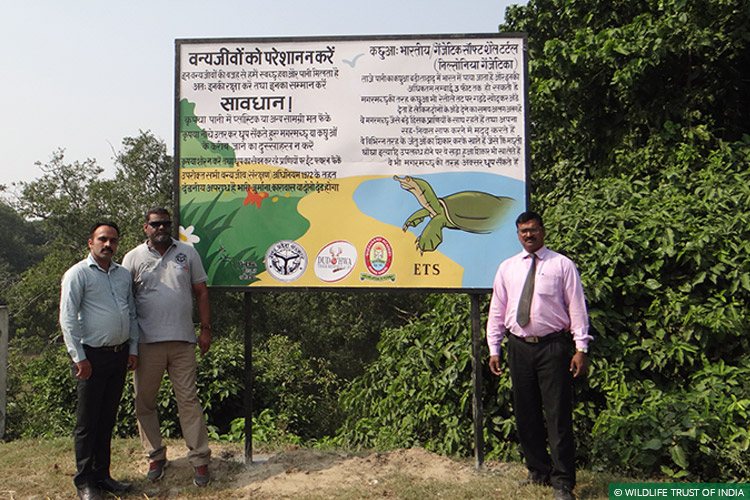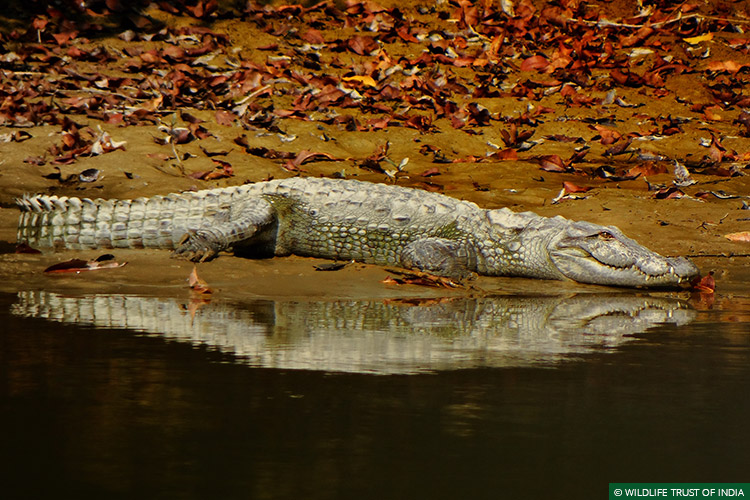
Dudhwa National Park, Uttar Pradesh, November 18, 2016: In a bid to educate and sensitise tourists to avoid interacting with and disturbing reptiles in a rivulet outside Dudhwa National Park, Wildlife Trust of India (WTI), as part of a Rapid Action Project (RAP) conducted with support from Europaeische Tierschutzstiftung (ETS), Dudhwa Tiger Reserve, Uttar Pradesh Forest Department, and the Vivekanand Academy, Bhira Kheri, has arranged for the creation and installation of prominently displayed information boards in the area.
Situated in northern Uttar Pradesh, Dudhwa National Park has a healthy population of marsh crocodiles (muggers) and Gangetic soft-shelled turtles in its rivers and rivulets, although actual estimations have never been conducted. A part of this population – about 80-100 muggers and 12-15 turtles – exists on a three to four kilometre stretch on a rivulet abutting the forests of Dudhwa NP. One section of this rivulet is accessible from the main road that connects the town of Palia to the national park, and consequently sees a large number of people stopping daily to catch a glimpse of these reptiles.
As with most situations of unregulated tourism, tourists and onlookers that frequent the area are unaware of the species’ importance to such riverine ecosystems, their evolutionary success, as well as the factors that affect their survival. Invariably, people are seen pelting stones to evoke a response from sedentary basking crocodiles, or throwing waste, including polythene bags and other forms of plastic waste, into the river to attract the foraging turtles.

Turtles have repeatedly been observed getting snagged up in plastic waste in the area. Further, some people who stop to see the reptiles have been observed climbing down onto the banks of the rivulet in an attempt to approach basking crocodiles – whereupon the muggers, being shy creatures on land, are immediately disturbed and take to the water. Such constant disturbances can lead to disrupted thermoregulation (especially in winters), which may lead to reduced food intake and thus adversely impact the crocodiles. Moreover, while muggers do not pose a serious threat to people, like any wild animal they can attack when provoked. The current situation certainly has the potential to escalate into a level of conflict where human fatalities could occur, leading to eventual resentment against the animals.
To address the situation and sensitise visitors, four large information boards have been installed in the area – two on either side of a bridge where people most frequently halt. They provide information in English and Hindi to people stopping to see the crocodiles and turtles, while also outlining precautions to be observed to prevent disturbance to these reptiles. The boards have been placed strategically to also obstruct the paths that lead onto the banks of the rivulet from the road.
Currently less than 4000 estimated mugger crocodiles live in the wild in India, with higher concentrations reported from the states of Tamil Nadu, Maharashtra, Kerala and Uttar Pradesh. No concrete estimates exist for Gangetic soft-shelled turtles, which are hunted and traded for bushmeat in various parts of the country. Both species are classified as ‘Vulnerable’ on the IUCN Red List and have been accorded the highest legal protection under Schedule I of India’s Wild Life (Protection) Act, 1972. It is hoped that these signages will provide important information to interested visitors, while also giving the local forest department staff leverage to crack down on the illegal disturbance being caused to wildlife.
